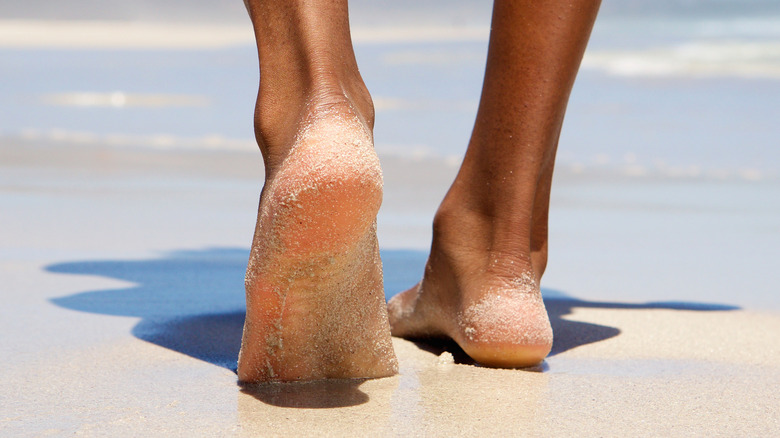- Empty cart.
- Continue Shopping
How to Prevent and Treat Cracked Heels in Women

Cracked heels, though common, can be painful and unsightly. They often result from dry skin, lack of moisture, and prolonged pressure on the feet. For women, who are often on their feet for extended periods, it’s important to take proactive steps to prevent and treat cracked heels.
Prevention:
1. Regular Moisturizing:
- Choose a Quality Foot Cream: Opt for a thick, emollient-rich foot cream or ointment. Look for ingredients like shea butter, glycerin, or petroleum jelly.
- Apply Daily: Moisturize your feet daily, especially after bathing. Pay extra attention to the heels and any areas prone to dryness.
2. Exfoliation:
- Use a Pumice Stone or Foot File: Gently exfoliate your heels to remove dead skin cells. Do this after soaking your feet in warm water for about 10-15 minutes.
- Avoid Over-Exfoliating: Be gentle to avoid further irritation. Once or twice a week should suffice.
3. Proper Footwear:
- Avoid Open-Back Shoes: Opt for closed-back shoes, especially during colder months, to reduce exposure to dry air.
- Choose Supportive Shoes: Wear shoes that provide adequate arch support to prevent excess pressure on the heels.
4. Stay Hydrated:
- Drink Plenty of Water: Proper hydration helps maintain skin elasticity, reducing the risk of dryness and cracking.
5. Balanced Diet:
- Include Essential Nutrients: Foods rich in Omega-3 fatty acids, zinc, and vitamins A and E can promote skin health.
6. Avoid Prolonged Standing:
- Take Breaks: If your job involves long periods of standing, take short breaks to alleviate pressure on your feet.
Treatment:
1. Warm Foot Soaks:
- Use Epsom Salt: Dissolve a handful of Epsom salt in warm water and soak your feet for about 15-20 minutes. This helps soften the skin.
2. Heel Balms or Salves:
- Apply Overnight: Use a thick moisturizing balm or salve and wear cotton socks overnight to lock in moisture.
3. Honey and Warm Water:
- Create a Soak: Mix honey with warm water and soak your feet for 15-20 minutes. Honey has natural antibacterial properties.
4. Coconut Oil:
- Apply Liberally: Apply coconut oil to your heels and wear socks overnight. It’s a natural emollient that can help soften the skin.
5. Vinegar Soak:
- Combine with Warm Water: Mix vinegar and warm water in equal parts. Soak your feet for about 15-20 minutes, then gently scrub with a pumice stone.
6. Medical Attention:
- Consult a Podiatrist: If cracks are severe, painful, or persist, seek professional help. A podiatrist can recommend specific treatments or ointments.
Additional Tips:
- Avoid Harsh Soaps: Use mild, moisturizing soaps to prevent further drying of the skin.
- Wear Comfortable Socks: Opt for natural fiber socks that allow your feet to breathe.
- Limit Use of High Heels: Prolonged use of high heels can increase pressure on the heels. Try to alternate with more comfortable footwear.
- Regular Foot Massages: Massaging your feet with a nourishing oil can improve blood circulation and moisturize the skin.
Remember, consistency is key when it comes to preventing and treating cracked heels. By following these steps and making them a part of your regular foot care routine, you can maintain soft, healthy heels and enjoy pain-free walking. If cracks persist or worsen, seek professional medical advice.








